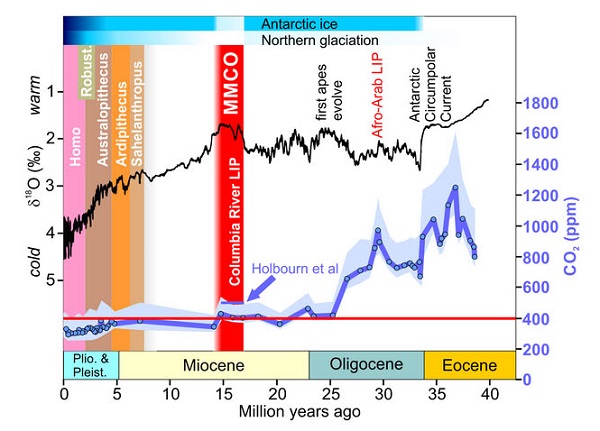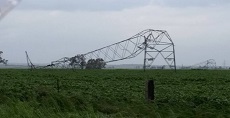1. New research reveals extreme oxygen loss in oceans during past climate change
New research published this week reveals that vast stretches of the ocean interior abruptly lost oxygen during the transition out of the last ice age that occurred 17,000–10,000 years ago.
If that happened as a result of the relatively gentle forcing caused by changes in the Earth’s orbit, imagine what is possible now!
Like most of the life on the planet, the large majority of marine organisms need oxygen to live. Most marine life, from salmon, crabs, to shellfish, respires oxygen and many forms are intolerant of low oxygen seawater.
So-called ‘dead zones’ do contain life comprised of worms, bacteria, specialized urchins and bivalves, and other extremophiles, just not the kind of tucker we like to eat.
2. India ‘walking the talk’ on climate change
India is one country a bit allergic to discussing agriculture and climate pollution. They worry about feeding the millions. They also got a serve from Obama when he was there:
During a visit to New Delhi last month, Obama warned that the world does not “stand a chance against climate change” unless developing countries such as India reduce their dependence on fossil fuels.
India, as usual, is impervious to pressure, but the environment minister reckons they are doing their bit. New prime minister Narendra Modi is keen on renewable energy:
Since coming to power in May, Modi has pledged to increase India’s renewable energy in a bid to lower coal use and bring electricity to more than 300 million poor people currently without power.
Modi, who built up a solar industry in Gujarat state when he was chief minister, has set a target for India to have 100 gigawatts of solar capacity by 2022.
3. Abbott’s decline attributed to G20 Obama snub and climate change
On Newspoll Abbott’s net approval rating is now -44 (68% disapprove, 24% approve of how he is doing his job). Jason Wison says:
After a polling mini-recovery of sorts for Abbott between July and September, November – the month of the G20 and Obama’s address – marked a turning-point. Between September and November, Abbott’s always-poor net satisfaction ratings had improved and stabilised a little; from November they declined rapidly to where they are today. In some polls, Abbott now has more than half the voters saying that he should resign. November was also the month in which Bill Shorten decisively overcame Abbott as preferred prime minister, and Shorten’s lead is now wider than ever.
Wilson reminds us that Abbott refused to accept President Obama’s request to put climate change on the G20 agenda. Obama’s response was to kick off his stay with an address at the University of Queensland embarrassing Abbott with his references to Australia and climate change.
4. Maurice Newman wrongly claimed a UK charity had blamed the deaths of elderly people on renewable energy policies
Maurice Newman is of course Tony Abbott’s top science advisor. Graham Readfearn investigated his claim and found:
Newman is not only misrepresenting the charity’s position, he appears to be making up positions that the charity simply does not hold.
Also:
between 2004 and 2011 the average annual energy bill in the UK went up from £610 to £970.
Only £30 of that £360 increase was due to costs related to low-carbon power generation.
Most of the increase, the analysis said, was down to higher gas prices and network costs (maintaining poles and wires).
In my view, Newman’s attempt to pin the blame for the deaths of UK pensioners on renewable energy policies is either disgustingly dishonest or pathetically sloppy.
In the rest of the article Readfearn gives an explainer on how world surface temperature is measured.
5. Miocene temperatures
This Skeptical Science post gives a detailed account of what happened 14 to 17 million years ago in the “Mid Miocene Climate Optimum” (MMCO):
The MMCO was ushered in by CO2 levels jumping abruptly from around 400ppm to 500ppm, with global temperatures warming by about 4°C and sea levels rising about 40m (130 feet) as the Antarctic ice sheet declined substantially and suddenly.
Over the succeeding 2-3 million years Antarctic ice fluctuated dynamically in response to orbital wobbles, showing it was balanced on a knife-edge between a world with little ice and a world with substantial ice caps. Ice-free parts of Antarctica were rain-drenched and supported lush vegetation, while Arctic land was covered by temperate forests. Parts of the planet that had been arid before the MMCO rapidly re-greened and reforested (eg Patagonia).
This graph plots temperature and CO2:

There were some differences between then and now. The Isthmus of Panama had not closed, for example. The warming happened on a warmer base.
Our warming is about 1000 times faster, giving less time for ecosystems to adapt. This is problematic for ocean acidification inter alia.
 On September 28 we had the first anniversary of the dirty big storm the brought down the power pylons in South Australia causing a state-wide blackout, as the Heywood interconnector exceeded capacity and tripped.
On September 28 we had the first anniversary of the dirty big storm the brought down the power pylons in South Australia causing a state-wide blackout, as the Heywood interconnector exceeded capacity and tripped.



